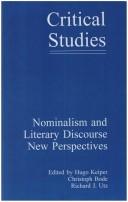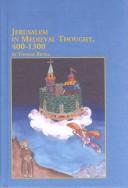| Listing 1 - 4 of 4 |
Sort by
|

ISBN: 9042002883 9789042002883 9042002786 9789042002784 9789004455009 9004455000 Year: 1997 Volume: 10 Publisher: Amsterdam: Rodopi,
Abstract | Keywords | Export | Availability | Bookmark
 Loading...
Loading...Choose an application
- Reference Manager
- EndNote
- RefWorks (Direct export to RefWorks)
Influential accounts of European cultural history variously suggest that the rise of nominalism and its ultimate victory over realist orientations were highly implemental factors in the formation of Modern Europe since the later Middle Ages, but particularly the Reformation. Quite probably, this is a simplification of a state of affairs that is in fact more complex, indeed ambiguous. However, if there is any truth in such propositions - which have, after all, been made by many prominent commentators, such as Panofsky, Heer, Blumenberg, Foucault, Eco, Kristeva - we may no doubt assume that literary texts will have responded and in turn contributed, in a variety of ways, to these processes of cultural transformation. It seems of considerable interest, therefore, to take a close look at the complex, precarious position which literature, as basically a symbolic mode of signification, held in the perennial struggles and discursive negotiations between the semiotic 'twin paradigms' of nominalism and realism. This collection of essays (many of them by leading scholars in the field) is a first comprehensive attempt to tackle such issues - by analyzing representative literary texts in terms of their underlying semiotic orientations, specifically of nominalism, but also by studying pertinent historical, theoretical and discursive co(n)texts of such developments in their relation to literary discourse. At the same time, since 'literary nominalism' and 'realism' are conceived as fundamentally aesthetic phenomena instantiating a genuinely 'literary debate over universals', consistent emphasis is placed on the discursive dimension of the texts scrutinized, in an endeavour to re-orient and consolidate an emergent research paradigm which promises to open up entirely new perspectives for the study of literary semiotics, as well as of aesthetics in general. Historical focus is provided by concentrating on the English situation in the era of transition from late medieval to early modern (c. 1350-1650), but readers will also find contributions on Chrétien de Troyes and Rabelais, as well as on the 'aftermath' of the earlier debates - as exemplified in studies of Locke and (post)modern critical altercations, respectively, which serve to point up the continuing relevance of the issues involved. A substantial introductory essay seeks to develop an overarching theoretical framework for the study of nominalism and literary discourse, in addition to offering an in-depth exploration of the 'nominalism/realism-complex' in its relation to literature. An extensive bibliography and index are further features of interest to both specialists and general readers.
Literary semiotics --- Nominalism in literature --- Discourse analysis, Literary --- Literary discourse analysis --- Rhetoric --- Literary style --- Literary discourse --- Nominalism
Book
ISBN: 0691632154 140086139X 0691602697 9781400861392 Year: 2014 Publisher: Princeton, NJ
Abstract | Keywords | Export | Availability | Bookmark
 Loading...
Loading...Choose an application
- Reference Manager
- EndNote
- RefWorks (Direct export to RefWorks)
The closely related problems of creativity and freedom have long been seen as emblematic of the Renaissance. Ullrich Langer, however, argues that French and Italian Renaissance literature can be profitably reconceived in terms of the way these problems are treated in late medieval scholasticism in general and nominalist theology in particular. Looking at a subject that is relatively unexplored by literary critics, Langer introduces the reader to some basic features of nominalist theology and uses these to focus on what we find to be "modern" in French and Italian literature of the fifteenth and sixteenth centuries.Langer demonstrates that this literature, often in its most interesting moments, represents freedom from constraint in the figures of the poet and the reader and in the fictional world itself. In Langer's view, nominalist theology provides a set of concepts that helps us understand the intellectual context of that freedom: God, the secular sovereign, and the poet are similarly absolved of external necessity in their relationships to their worlds.Originally published in 1990.The Princeton Legacy Library uses the latest print-on-demand technology to again make available previously out-of-print books from the distinguished backlist of Princeton University Press. These editions preserve the original texts of these important books while presenting them in durable paperback and hardcover editions. The goal of the Princeton Legacy Library is to vastly increase access to the rich scholarly heritage found in the thousands of books published by Princeton University Press since its founding in 1905.
Renaissance. --- Theology in literature. --- Nominalism in literature. --- Free will and determinism in literature. --- French literature --- Italian literature --- Renaissance --- Revival of letters --- Civilization --- History, Modern --- Civilization, Medieval --- Civilization, Modern --- Humanism --- Middle Ages --- History and criticism. --- History --- Italy --- France --- Intellectual life
Book
ISBN: 0691068534 0691602697 0691632154 1322018871 140086139X Year: 1990 Publisher: Princeton, N.J. Princeton University Press
Abstract | Keywords | Export | Availability | Bookmark
 Loading...
Loading...Choose an application
- Reference Manager
- EndNote
- RefWorks (Direct export to RefWorks)
The closely related problems of creativity and freedom have long been seen as emblematic of the Renaissance. Ullrich Langer, however, argues that French and Italian Renaissance literature can be profitably reconceived in terms of the way these problems are treated in late medieval scholasticism in general and nominalist theology in particular. Looking at a subject that is relatively unexplored by literary critics, Langer introduces the reader to some basic features of nominalist theology and uses these to focus on what we find to be "modern" in French and Italian literature of the fifteenth and sixteenth centuries.Langer demonstrates that this literature, often in its most interesting moments, represents freedom from constraint in the figures of the poet and the reader and in the fictional world itself. In Langer's view, nominalist theology provides a set of concepts that helps us understand the intellectual context of that freedom: God, the secular sovereign, and the poet are similarly absolved of external necessity in their relationships to their worlds.Originally published in 1990.The Princeton Legacy Library uses the latest print-on-demand technology to again make available previously out-of-print books from the distinguished backlist of Princeton University Press. These editions preserve the original texts of these important books while presenting them in durable paperback and hardcover editions. The goal of the Princeton Legacy Library is to vastly increase access to the rich scholarly heritage found in the thousands of books published by Princeton University Press since its founding in 1905.
Free will and determinism in literature. --- French literature --- Italian literature --- Nominalism in literature. --- Renaissance. --- Theology in literature. --- History and criticism. --- France --- Italy --- Intellectual life --- 16th century --- History and criticism --- 15th century --- To 1500 --- 1268-1559 --- Renaissance --- French literature - 16th century - History and criticism. --- Italian literature - 16th century - History and criticism. --- Italian literature - 15th century - History and criticism. --- French literature - To 1500 - History and criticism. --- France - Intellectual life - 16th century. --- Italy - Intellectual life - 1268-1559.

ISBN: 088946264X 0889462658 9780889462656 9780889462649 Year: 1987 Volume: 3 Publisher: Lewiston (N.Y.): Mellen,
Abstract | Keywords | Export | Availability | Bookmark
 Loading...
Loading...Choose an application
- Reference Manager
- EndNote
- RefWorks (Direct export to RefWorks)
English literature --- Nominalism in literature --- Literature, Medieval --- History and criticism --- Theory, etc --- Chaucer, Geoffrey, --- Philosophy --- History of civilization --- anno 500-1499 --- Social history --- Women in art --- Women in literature --- Women --- Woman (Christian theology) in literature --- Women in drama --- Women in poetry --- Feminism --- History --- Social conditions --- Women in literature. --- Women in art. --- Social conditions. --- Women - History - Middle Ages, 500-1500. --- Social history - Medieval, 500-1500. --- Women - Social conditions. --- English literature - Middle English, 1100-1500 - History and criticism - Theory, etc --- Literature, Medieval - History and criticism - Theory, etc --- Chaucer, Geoffrey, - -1400 - Philosophy --- FEMMES --- FEMMES DANS LA LITTERATURE --- FEMMES DANS L'ART --- HISTOIRE --- 500-1500 (MOYEN AGE) --- CONDITIONS SOCIALES --- Chaucer, Geoffrey, - -1400
| Listing 1 - 4 of 4 |
Sort by
|

 Search
Search Feedback
Feedback About UniCat
About UniCat  Help
Help News
News